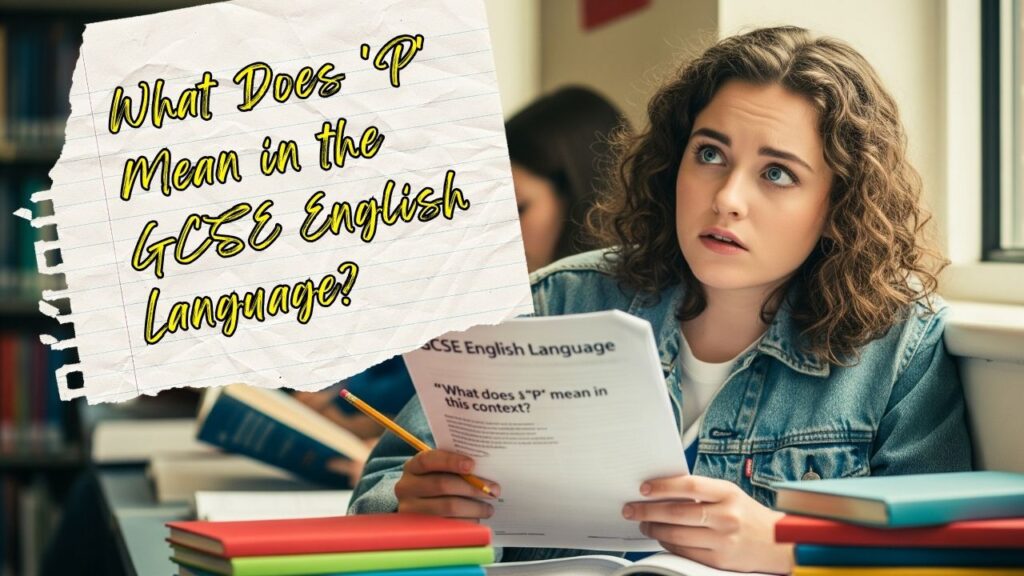
If you’ve been searching for information about the ‘P’ grade in GCSE English Language, you’re not alone. This question appears on student forums, social media platforms, and Google searches thousands of times each year. Students, parents, and even some teachers seem confused about whether this grade exists and what it might mean.
Here’s the straight answer: There is no ‘P’ grade in GCSE English Language. This grade simply doesn’t exist in the current GCSE system. But the fact that so many people are asking about it reveals a fascinating story about educational confusion, social media myths, and how different qualification systems get mixed up in students’ minds.
Let’s dive deep into everything you need to know about the mysterious ‘P’ grade and why people think it exists.
The Great ‘P’ Grade Mystery: Where Did This Come From?
The Social Media Phenomenon
Every August, when GCSE results are released, social media explodes with questions about grades. Among posts celebrating grade 9s and commiserating over disappointing results, you’ll find dozens of confused students asking: “What does P mean?” or “I think I got a P grade – is that good or bad?”
This annual confusion has created what we might call the ‘P’ grade urban legend. Like all good myths, it contains a grain of truth that makes it believable, but the reality is quite different from what people think.
The myth persists because students share incomplete information online. Someone might post “I got P in my results” without mentioning they’re talking about a BTEC qualification, not GCSE. Other students see this and assume P grades exist in GCSEs too.
Why Students Believe ‘P’ Grades Exist
There are several reasons why the ‘P’ grade myth won’t die:
1. Confusion with Other Qualifications: This is the biggest reason. Many students take a mixture of GCSEs and vocational qualifications like BTEC. BTEC courses do use ‘P’ for Pass, and students often mix up their different qualification results.
2. International Student Influence: Students who’ve moved to the UK from other countries often expect to find familiar grading systems. In many countries, ‘P’ for Pass is completely normal in academic subjects.
3. Wishful Thinking: Some students hope that ‘P’ might be a secret passing grade for borderline cases. Unfortunately, this isn’t how GCSE grading works.
4. Misinformation Spread: Once wrong information gets online, it spreads quickly. Students share what they think they know, creating an echo chamber of misinformation.
The Historical Context of ‘P’ Grades
To understand why people think ‘P’ grades exist in GCSEs, we need to look at where ‘P’ grades actually come from:
1. Vocational Education: Since the 1980s, UK vocational qualifications have used ‘P’ to mean Pass. This includes BTEC, City & Guilds, and other work-related courses.
2. International Systems: Cambridge International GCSEs (IGCSEs) and other international qualifications sometimes use different grading systems that can include ‘P’ grades.
3. University Systems: Many UK universities use Pass/Fail systems for some modules, where ‘P’ indicates a pass.
4. Professional Qualifications: Industry certifications often use Pass/Fail grading, where ‘P’ is common.
Where ‘P’ Grades Actually Exist
1. BTEC and Vocational Qualifications
BTEC qualifications are the most common place students encounter ‘P’ grades. These practical, work-focused courses use a four-tier system:
- Distinction* (D*): Outstanding work
- Distinction (D): Excellent work
- Merit (M): Good work
- Pass (P): Satisfactory work that meets basic requirements
A ‘P’ grade in BTEC means you’ve demonstrated the essential skills and knowledge for that subject, but without the higher-level analysis and application shown in Merit or Distinction work.
Many students take BTEC alongside GCSEs, which is where the confusion starts. They might get a ‘P’ in BTEC Business and assume that ‘P’ grades exist in all their subjects.
2. Cambridge International Qualifications
Some international schools in the UK offer Cambridge IGCSE alongside or instead of UK GCSEs. These qualifications sometimes use grading systems that include ‘P’ for certain assessment components or specific subjects.
Students moving between international and UK systems often bring expectations from their previous education, leading to confusion about what grades exist where.
3. University and Adult Education
Higher education institutions frequently use Pass/Fail systems, especially for:
- Foundation courses
- Skills modules
- Professional development units
- Some master’s degree components
Adult learners returning to education might expect similar systems in GCSEs based on their university experience.
Read More – How Long Do GCSE Exams Last?
The Real GCSE English Language Grading System
Only Numbers 9-1 Plus U
GCSE English Language uses exactly eight possible outcomes:
Grades 9-1: These are the pass grades, with 9 being the highest and 1 being the lowest pass.
Grade U: This means Unclassified – your work didn’t meet the minimum standard for grade 1.
That’s it. No letters, no ‘P’, no secret grades. The system is deliberately simple and standardized across all exam boards.
Why No ‘P’ for Pass?
You might wonder why GCSE doesn’t use ‘P’ for Pass like other qualifications. There are several reasons:
1. Clear Hierarchy: Numbers create an obvious ranking from best (9) to lowest pass (1). Everyone understands that 6 is better than 5.
2. International Recognition: Numbers translate easily across different countries and education systems.
3. Avoiding Confusion: Letters could be confused with the old A*-G system or with vocational qualification grades.
4. Statistical Precision: Numbers allow for precise statistical analysis and comparison between years.
What Happens to Students Who Think They Got ‘P’
When students believe they’ve received a ‘P’ grade in GCSE English Language, it’s usually because:
- Misreading Results: They might have misread a ‘9’ as ‘P’ on a poorly printed or viewed results slip
- Mixed Qualifications: They got ‘P’ in a BTEC subject and assumed it applied to all their results
- Unofficial Predictions: A teacher mentioned “pass” informally and they thought this was a grade
- Online Misinformation: They believed incorrect information from social media or unofficial websites

How the ‘P’ Grade Myth Spreads Online
1. Social Media Echo Chambers
The ‘P’ grade myth thrives on social media because:
Incomplete Information: Students post partial information without context Confirmation Bias: People look for information that confirms what they already believe Rapid Sharing: Wrong information spreads faster than corrections Authority Confusion: Students trust other students over official sources
2. Common Online Myths About ‘P’ Grades
Here are the most persistent myths about ‘P’ grades in GCSE English Language:
Myth 1: “P means you just barely passed” Reality: Grade 1 is the lowest pass grade. There’s no grade between 1 and U.
Myth 2: “P is for predicted grades that became actual grades” Reality: Predicted grades are internal estimates. Actual grades are always numbers 9-1 or U.
Myth 3: “Some exam boards use P instead of numbers” Reality: All GCSE exam boards must use the same 9-1 grading system.
Myth 4: “P is a new grade introduced recently” Reality: The 9-1 system has been stable since 2017 with no plans for additional grades.
3. Fighting Misinformation
To combat ‘P’ grade misinformation:
Check Official Sources: Always verify grade information with exam boards (AQA, Edexcel, OCR, WJEC) or Ofqual Question Social Media: Be skeptical of grade information from unofficial sources Ask Schools Directly: Your school’s exams officer knows exactly what grades exist Use Government Websites: Gov.uk provides accurate information about GCSE grading
What to Do If You Think You Got a ‘P’ Grade
Step 1: Check Your Results Slip Carefully
Look at your actual results certificate or slip. GCSE English Language will show:
- Your candidate number
- The subject name
- A single digit (9, 8, 7, 6, 5, 4, 3, 2, 1) or the letter U
- The exam board name
If you see anything else, you might be looking at:
- A different qualification (like BTEC)
- Predicted grades
- An unofficial document
Step 2: Contact Your School
If you’re still confused, speak to:
- Your English teacher
- The exams officer
- A senior member of staff
They can explain exactly what your results mean and help you understand any mixed qualifications you might have taken.
Step 3: Understand Your Options
Once you know your actual GCSE English Language grade:
- Grades 4-9: You’ve passed! Consider your next steps based on your specific grade
- Grades 1-3: You’ve passed but might want to retake for a higher grade
- Grade U: You’ll probably want to retake or consider alternative qualifications
Read More – What is the Difference Between GCSE and A-Level?
The Psychology Behind Grade Confusion
1. Why Students Want ‘P’ Grades to Exist
There’s something psychologically appealing about ‘P’ for Pass:
Simplicity: Pass/Fail feels simpler than numbered grades Familiarity: Many students know Pass/Fail from other contexts Hope: ‘P’ might feel like a safety net for worried students Control: Understanding grades helps students feel more in control
2. The Anxiety Factor
Grade confusion often increases around results time because:
- Students are already anxious about their results
- They’re processing lots of information quickly
- They might be comparing themselves to others
- They’re making important decisions about their future
This anxiety can make students more likely to believe in alternative grading systems that might seem more forgiving or offer additional chances.

International Perspectives on ‘P’ Grades
1. Countries That Use ‘P’ in Academic Grading
Understanding why students expect ‘P’ grades helps explain the confusion:
2. How This Affects UK Students
Students from these countries, or those with international experience, often:
- Expect familiar grading systems
- Assume ‘P’ exists in UK qualifications
- Share their expectations with UK-born students
- Create confusion through well-meaning but incorrect advice
The Future of GCSE Grading
Will ‘P’ Grades Ever Be Introduced?
There are no current plans to introduce ‘P’ grades to the GCSE English Language. The 9-1 system is considered successful because:
- It provides clear differentiation between performance levels
- It’s understood by universities and employers
- It allows for international comparison
- It maintains standards year-on-year
Potential Changes to Consider
While ‘P’ grades aren’t planned, the GCSE system does evolve:
- Digital Assessment: Online exams might change how results are presented
- Skills-Based Assessment: Focus might shift toward specific competencies
- Continuous Assessment: Coursework might return in modified forms
- International Alignment: Changes might reflect global education trends
However, any major changes would be announced well in advance and wouldn’t happen without extensive consultation.
Practical Advice for Students and Parents
How to Avoid Grade Confusion
- Stick to Official Sources: Use exam board websites and government information
- Understand Your Qualifications: Know whether you’re taking GCSEs, BTECs, or other qualifications
- Ask Questions Early: Don’t wait until results day to understand how grading works
- Keep Records: Save official information about your courses and grading systems
Supporting Confused Students
If you’re helping someone who believes in ‘P’ grades:
- Be patient and understanding
- Provide official sources of information
- Explain the difference between qualification types
- Help them focus on their actual grades and options
Frequently Asked Questions About ‘P’ Grades
1. Why do so many people think ‘P’ grades exist in the GCSE English Language?
The confusion comes mainly from students mixing up different types of qualifications. BTEC and other vocational courses do use ‘P’ for Pass, and many students take these alongside GCSEs. When they discuss their results, they might mention getting ‘P’ without specifying which qualification it’s from. Social media then spreads this incomplete information, making other students think GCSE uses ‘P’ grades too. International students also contribute to this confusion because many countries do use ‘P’ grades in their academic systems.
2. Could ‘P’ be a mistake on my results slip?
If you think you see ‘P’ on your GCSE English Language results, you should double-check what you’re looking at. It could be a printing error where a number looks like ‘P’, or you might be looking at results for a different qualification like BTEC. GCSE English Language only uses grades 9-1 and U. Contact your school’s exams officer immediately if you’re unsure – they can clarify exactly what qualification each grade refers to and help you understand your complete results.
3. Is ‘P’ used in any official UK qualifications that students might confuse with GCSE?
Yes, ‘P’ for Pass is widely used in BTEC qualifications, which many students take alongside GCSEs. BTEC uses Distinction*, Distinction, Merit, and Pass (P) grades. Some Cambridge International qualifications and other vocational courses also use ‘P’ grades. Additionally, some university courses and adult education programs use Pass/Fail systems. This is why students often encounter ‘P’ grades in their educational journey, even though it doesn’t exist in the GCSE English Language specifically.
4. What should I do if someone online tells me they got ‘P’ in the GCSE English Language?
You should be skeptical of this information and not assume it applies to the standard UK GCSE system. The person might be referring to a different qualification, misunderstanding their results, or accidentally spreading misinformation. Always verify grade information through official sources like exam board websites (AQA, Edexcel, OCR, WJEC) or the government’s education website. If you’re confused about grading systems, ask your school’s exams officer rather than relying on social media information.
5. Could the GCSE system introduce ‘P’ grades in the future?
There are currently no plans to introduce ‘P’ grades to GCSE English Language or any other GCSE subjects. The 9-1 grading system was carefully designed and implemented between 2017-2019, and it’s considered successful by educators and policymakers. Any major changes to GCSE grading would require extensive consultation, research, and advance notice to schools and students. The current system provides clear differentiation between performance levels and is well-understood by universities and employers, so there’s no compelling reason to add letter grades like ‘P’ to the existing number system.
